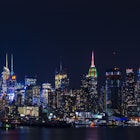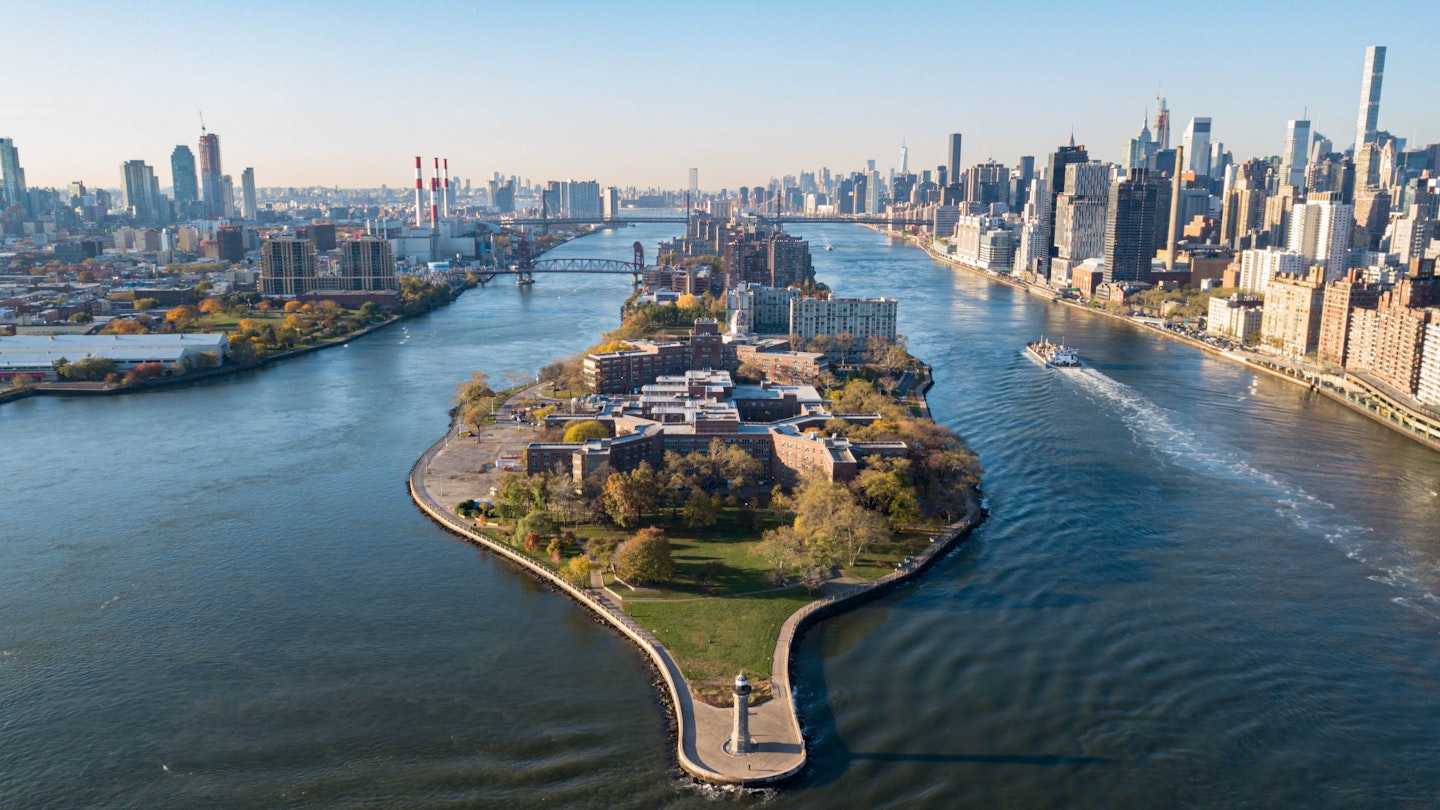

Super-skinny, 2-mile-long Roosevelt Island occupies prime real estate between Midtown Manhattan and Queens. Emma Griffiths/Shutterstock
Unfurling like an eel in New York City’s East River, Roosevelt Island is a full 2 miles long yet a mere 800ft across at its widest point.
This long sliver of prime real estate has a fascinating history: for almost 150 years, it was the site of numerous hospitals, prisons, asylums and other grim institutions to which “undesirable” patients and inmates were banished. Over the last half-century, however, a remarkable planned community has taken root, with some 12,000 New Yorkers who live a uniquely low-key version of big-city life now calling the redeveloped island home.
In recent years, further grand projects – including a mighty memorial park and a cutting-edge tech campus – have continued to put space between the island’s troubled history and its lovely present, drawing visitors from all over. And the preferred way to get to the island may be the most exciting part of any excursion here.
Intrigued yet? Here’s how to get to know Roosevelt Island, in six ways.
Hang out (literally) in NYC’s only cable car
Despite its super-central location, Roosevelt Island remained unconnected to the rest of the city for centuries. Today, a road bridge to Queens, a subway stop and a new-ish ferry terminal offer many ways to cross the water – yet none compares to what might be the island’s most famous attraction.
There might be no better ride for the money in New York than the iconic red cable car (or aerial tram) that departs from Midtown Manhattan. Gripping fast-moving steel cables above, the bus-sized cabin quickly makes a vertiginous ascent (almost 250ft!) in a couple of minutes, as it floats with surprising smoothness between a forest of high rises and the tower of the Ed Koch Queensboro Bridge. Before you know it, the East River is beneath you, and the skyline becomes a spectacular panorama as the tram whisks you across the water. The descent comes quickly – hopefully before you’ve had time to recall that harrowing rescue scene from Spider-Man. All for the price of one MetroCard swipe.
Detour: On your way up, you might catch a quick glimpse of a historic stone-fronted structure between the ultra-modern buildings of E 60th St. Dating to the 18th century, the Mount Vernon Hotel was built as a country inn for day-trippers escaping the clamor of the city, whose limits then ended many miles downtown. (Who needs the Hamptons?) The improbably preserved building offers a fascinating glimpse into Manhattan’s bucolic past.

Consider the island’s grim history at the ruins of the Smallpox Hospital
Native Americans first arrived on Roosevelt Island some 12,000 years ago, before Dutch colonists “purchased” the land in the 17th century and cleared it for farmland. The Blackwell later family settled the island over four generations before selling the whole lot – then known as Blackwell’s Island – to the government in 1828. (The deal was negotiated on the porch of Blackwell House, a 1796 mansion that still stands.)
Over the following century, New York City authorities turned the island into a complex of institutions designed to house – or, really, to get rid of – some of the city’s most vulnerable populations. A notorious prison, insane asylum, workhouse and hospitals for patients with smallpox, typhus and other infectious diseases soon gave Blackwell’s Island a well-deserved reputation for Dickensian squalor.
Happily, these institutions are long gone, with parks, playgrounds and other public spaces today occupying their former sites. Yet one physical trace of this past remains: the ruins of the Smallpox Hospital, to the island’s south. Now covered in ivy and hollowed out by the elements, this castle-like pile (now fenced off for safety) once housed patients who suffered greatly – or worse. As you take in the decaying structure’s eerie appeal, spare a thought for those who visited Roosevelt Island through no choice of their own.
Local tip: A row of cherry trees grows on the waterside pathway that leads from the tram to the island’s southern tip. Come April, they put on quite the show – and shots of these glorious white and pink blossoms against the backdrop of Manhattan will activate major FOMO among your followers.

Feel the calming grandeur of Franklin D Roosevelt Four Freedoms Park
The last project of master architect Louis Kahn, this monument to the legacy of President Franklin D Roosevelt (the island’s namesake) was left unrealized until 38 years after Kahn’s death. The stark yet uplifting result was well worth the wait. After ascending a grand set of marble steps just beyond the Smallpox Hospital, visitors traverse a lawn, flanked with elegantly planted trees, that tapers to a bust of FDR, the text of his famous “Four Freedoms” speech engraved on marble slabs that flank the sculpture. On the other side of the panels lies the pièce de résistance: “The Room,” a wide, water-level terrace that turns the very southern tip of the island, with New York’s skyline unfolding all around, into an extraordinary space for quiet reflection.
Local tip: From here, you’ll enjoy perhaps the best view in town of the modernist United Nations complex. The formation of this multilateral institution – and the establishment of its seat in New York – is one of FDR’s many important legacies.

Meet the start-up founders of tomorrow at the Cornell Tech campus
Put on a hoodie and sport sandals with white socks, and you might just pass for a student at Cornell Tech, a cutting-edge campus that’s been a work in progress (from scratch) over the last 15 years – with much more to come. Within these ultra-high-tech buildings, entrepreneurs and graduate students studying computer science, design and business engage in hands-on learning, exchange ideas and launch new companies. (Chances are at least one of them will achieve a trillion-dollar market cap someday.) While the university buildings are off-limits to visitors, the appealingly landscaped grounds feature plenty of lawns and seating areas for the use of laptop-toting students and interlopers alike. Take an alfresco break here for a taste of campus life you’ll find only in New York.
Local tip: After a stressful day in class (even if you’re just playing pretend), nothing lifts the spirits by lifting a glass at the Panorama Room, an 18th-floor bar atop the Graduate, a hotel on the campus. Through floor-to-ceiling windows, you’ll enjoy some of the best views of the city around (and there’s stiff competition).

Cycle the island’s perimeter to get a sense of New York City’s mighty infrastructure
The presence of very few cars on Roosevelt Island makes it a cyclist’s paradise, and a bikeable path encircles the island’s entire perimeter. Fresh air, river views and minimal traffic all make for prime pedaling – yet a bike tour of the island provides something even more special: a visual X-ray of the mighty systems that keep New York City going.
Start at the tram station by looking up at the underside of the Queensboro Bridge, with a lattice of steel beams that supports the weight of more than 150,000 crossing vehicles each day. Its four towers topped with decorative spires, this sturdily braced 1909 span is New York City infrastructure at its most Gotham City–esque. Pedaling up the island’s west side, take note of the half-exposed lanes of FDR Dr just across the water, which whisk traffic along the edge of the East River, and underneath the Manhattan apartment buildings, hospitals and parks that are dramatically cantilevered above. With its giant smokestack, the massive power station at E 74th St from 1902 is a beaux-arts marvel. A complementary hulk lies across from the island’s east side: the waterfront, 2480-megawatt Ravenswood Generating Station in Queens, which powers Times Square marquees, Wall Street trading desks, Fashion Week spotlights and everything else that makes the city hum. At the north end of the island, a 50ft-tall lighthouse dates from 1872. Made from locally quarried gneiss (and allegedly built by inmates incarcerated on the island), the beacon is a reminder of the fierce currents that still bedevil ships in these waters.
Local tip: Bring your bike on the F train; the island’s deep station here has elevators serving both platforms. If you’re more ambitious, a protected bike line runs parallel to the East River along Queens’ Vernon Blvd, connecting to the Roosevelt Island Bridge.

Savor the quiet
A 1969 master plan for Roosevelt Island’s redevelopment called for a mix of apartment towers and green spaces free of cars, a vision that came to pass in the decades that followed. And the residential core of the island is today a neighborhood unlike any other in New York.
While the centrally planned apartment blocks that radiate off Main St aren’t architectural marvels, the plan’s harmonious whole – which includes connecting footpaths and ample greenery – is far more gracious than the sum of its parts. What’s most remarkable is the sheer quiet of it all – the sounds of children playing or joggers huffing interrupted only rarely by a passing car or bus. You won’t be able to catch a cab here. But then again, you won’t need to.

Explore related stories

Local Voices
Everything you need to know about visiting New York in DecemberNov 25, 2024 • 10 min read


 Festivals & Events10 of the world's best places to celebrate New Year’s Eve
Festivals & Events10 of the world's best places to celebrate New Year’s EveNov 13, 2024 • 7 min read







